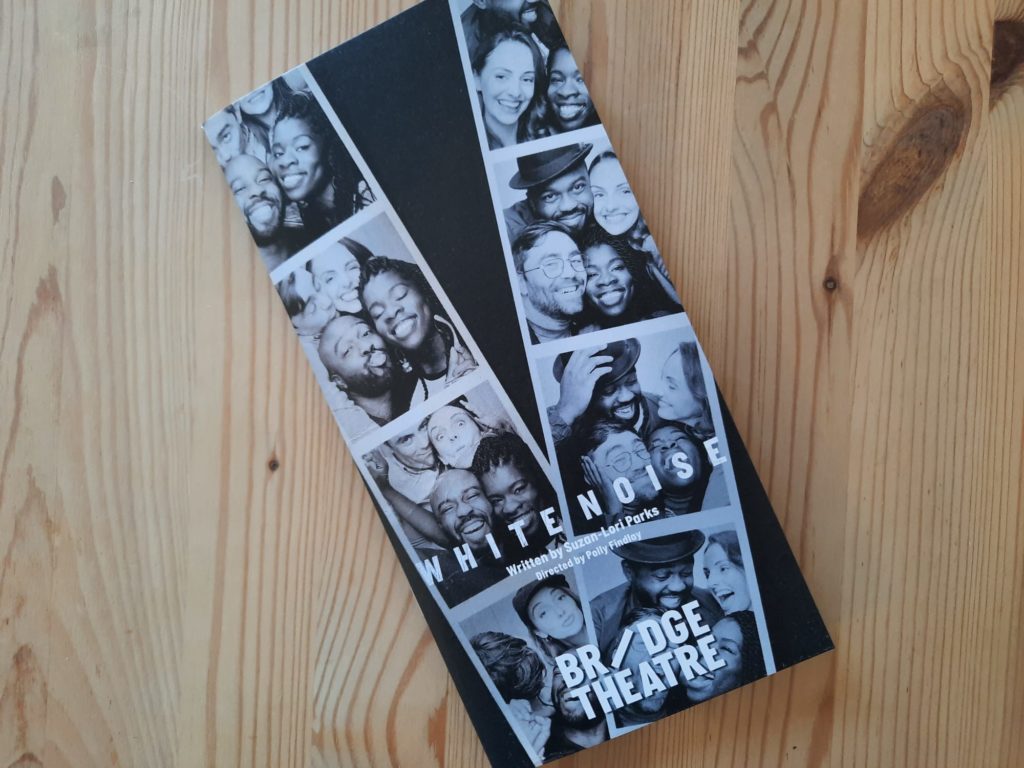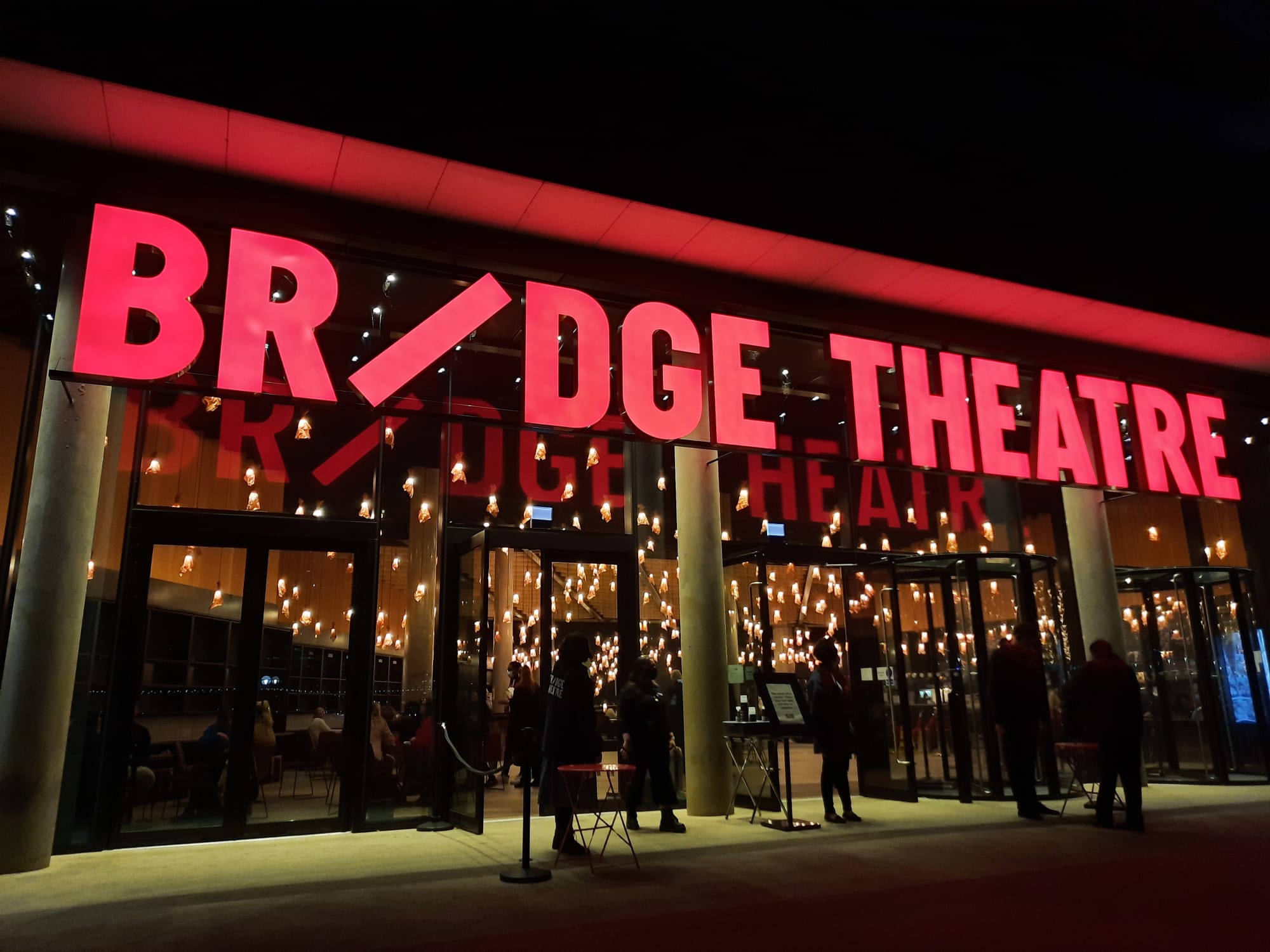White Noise – Bridge Theatre, London
A review of White Noise, a play by Pulitzer Prize winner Suzan-Lori Parks on now at the Bridge Theatre. A charged play that asks hard questions, but asks its audience to push the boundaries of realism with its central premise.

White Noise
My theatre-going buddy put this very well. White Noise is a thought experiment. Reading the programme, it was interesting to see that it wasn’t just us who thought this, it was actually fact. Playwright Suzan-Lori Parks talks about her earlier play Father Comes Home From the Wars. In it, an enslaved character wonders what will happen after he is free. If he is challenged by the authorities and can’t say who he belongs to as a sort of protection, what will happen? Parks takes this seed of an idea and expands it. She also translates it to a modern-day setting.
Leo is the character at the heart of White Noise. At the outset of the play he is harassed by the police, leaving him bruised and disillusioned. A chronic insomniac since childhood, there is a sense that Leo was already somewhat untethered from society. This incident severs the link entirely; Leo sees through the smokescreen of capitalism and woke-ness. He realises that we may not be all that far from the days of overt racism and enslavement. The leap that he makes in his mind is that the only way to address this is to sell himself into slavery. Literal slavery. For 40 days and 40 nights. To his friend Ralph.
This is so extreme, that it is a shock to the audience when Leo announces his intention. And for me, this is where the thought experiment angle comes in. It’s a bit like those Enlightenment stories where an extreme scenario is used to explain the workings of the author’s society. Like Gulliver’s Travels or something by Voltaire. I am by no means downplaying the very real experience of systemic or individual racism that people of colour face on a daily basis. I’m just saying that there is a suspension of disbelief in thinking that someone could get a lawyer to draw up a contract just like that and get a friend to agree to it with relative ease. Or that was my experience of the play in any case.
To Be Woke, Or To Wake Up
So now you know the central premise, I should tell you a bit more about the play. There’s Leo (Ken Nwosu), who you met already. He is an artist as well as an insomniac and would-be enslaved person. There’s Ralph (James Corrigan). He inherited money from an absent father, and finds out he lost out on a tenure position at his college. They are respectively living with Dawn (Helena Wilson), do-gooder social justice lawyer; and Misha (Faith Omole), who performs her blackness in her podcast ‘Ask a Black’. But back in college, the couples were the other way around. It’s a complicated friendship group.
The ‘quest’, as they term it, shines a very bright light on these relationships and on the individuals. Cracks start to form pretty quickly. Ralph leans into the role of ‘master’ pretty hard, and finds it’s a surprisingly short jump from there to full-blown racism. Leo wanted to use the 40 days to work through inherited trauma, but finds the lived experience more difficult than he imagined. And Misha and Dawn find themselves questioning their created personas and the motives that underpin them.
This is a lot to work through. No wonder the play is almost three hours long. And even then, I didn’t feel like there was a whole lot of characterisation that wasn’t directly related to the matter at hand. Although the characters can be a little flat at times, however, there is plenty of material to have the audience questioning themselves. Their own motives. Whether they are as liberal as they think they are. It’s an uncomfortable feeling to sit with. Parks’s play is steeped in the writings of people like Franz Fanon and James Baldwin, so there is plenty of follow-up reading for those who want to interrogate themselves further.
Do I Want To See This Play?
I think probably you do. It’s very well acted, for a start. Ken Nwosu in particular brings us into the world of the play from the outset when he delivers his monologue (each of the characters has one at one point in the play). He is warm and charismatic, yet with a tension just beneath the surface that lays the groundwork for what is to come. Faith Omole as well gives a nuanced performance, consciously rejecting her comfortable upbringing as she tries to enact what she thinks her audience wants.
The set design by Lizzie Clachan is also very good. The setting revolves between Leo and Dawn’s apartment and Ralph and Misha’s. There are subtle differences that underline their different fortunes. And a swift change turns it into Ralph’s gun range, The Spot. Site of many formative bonding experiences amongst the group. And some of the tensest scenes in the play.
From what I’ve seen of the reviews, White Noise has not been to everyone’s liking. I thought director Polly Findlay kept up a good pace, and the actors gave performances which allowed us to understand the characters and their flaws, even if they could have done with a bit more to go on. It feels like an important play, and one so relevant it may be surprising that Parks wrote it by 2016 before its first staging in 2019. If there’s any chance you could benefit from a thought experiment on racism, power and wokeness in the 21st Century, get yourself a ticket.
Salterton Arts Review’s rating: 4/5
White Noise on until 13 November 2021
Keep up with more London theatre news. Sign up below:
If you see this after your page is loaded completely, leafletJS files are missing.


One thought on “White Noise – Bridge Theatre, London”